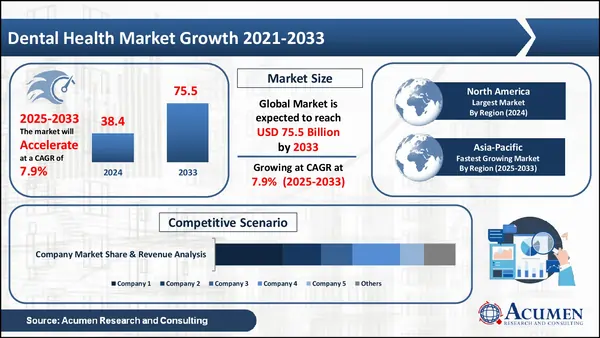The Dental Health Market, valued at USD 38.4 Billion in 2024, is anticipated to surpass USD 75.5 Billion by 2033, reflecting a projected CAGR of 7.9%

The global dental health industry is undergoing a substantial shift, driven by rising awareness of oral hygiene, technological developments in dental operations, and increased access to dental care services in both developed and emerging economies. Dental health, often thought to be just about cosmetics or emergency care, is today regarded as an important component of general well-being. As scientific evidence connects oral health to chronic diseases such as diabetes and cardiovascular disease, consumers and policymakers are allocating money to preventative dental care.
The industry offers a wide range of services, including preventative care (cleaning and fluoride treatment), restorative procedures (fillings, crowns, and root canals), cosmetic dentistry (whitening and veneers), and orthodontics and prosthodontics. Furthermore, dental health products such as toothbrushes, toothpaste, floss, and mouthwashes are a significant consumer goods segment.
The digitalization of dental practices, innovations like 3D-printed crowns, AI-based diagnostic tools, and minimally invasive techniques are changing how patients and practitioners interact. Meanwhile, the rise in dental insurance coverage and inclusion of dental benefits in government health schemes are pushing the dental hygiene market to new heights. With rising disposable income, lifestyle changes, and increased consumption of sugary foods, the frequency of dental problems is on the rise, raising the dental hygiene market potential.
An untapped opportunity lies in the expansion of dental care services into emerging and underserved regions through mobile dentistry units and teledentistry platforms. In low- and middle-income countries, access to dental professionals and infrastructure remains limited, especially in rural or remote areas. Poor oral hygiene habits, combined with a lack of professional care, lead to high rates of untreated dental issues in these populations.
Mobile dental clinics equipped with basic diagnostic and treatment tools offer a viable solution by bringing services directly to communities with limited access. These units are cost-effective, flexible, and can be integrated into broader public health outreach efforts. They are particularly useful for screening children in schools, elderly individuals in care facilities, and workers in industrial zones.
Simultaneously, teledentistry is emerging as a scalable solution to bridge the gap between patients and professionals. With the rise in smartphone penetration and internet connectivity, virtual consultations, follow-ups, and remote diagnostics are increasingly feasible. This is especially relevant in the post-COVID-19 landscape, where remote health services have become normalized.
One of the most transformative trends in the dental health market is the integration of artificial intelligence (AI) and digital technology in clinical procedures and patient care. From diagnostics to treatment planning, digitalization is streamlining operations and enhancing accuracy.
AI-powered diagnostic tools can analyze X-rays, detect early signs of cavities, or identify misalignments in real-time, often with greater precision than the human eye. These tools enable dentists to plan personalized treatments and reduce diagnostic errors. Digital impressions and CAD/CAM (computer-aided design/computer-aided manufacturing) technologies are increasingly replacing traditional molds, offering faster and more accurate restorations for crowns, bridges, and prosthetics.
Furthermore, the adoption of digital patient records, cloud-based management systems, and virtual appointment booking systems is making dental clinics more efficient. Patient experience is being enhanced through virtual smile simulations and 3D modeling, allowing them to visualize cosmetic results before committing to treatment.
The worldwide dental health market is divided into 3 segments: product, application, and regional markets
North America remains the most mature and lucrative region in the dental health market. The United States leads in terms of modern infrastructure, high dental insurance penetration, and a substantial presence of multinational and boutique dental businesses. Preventive treatment is commonly practiced, and cosmetic dentistry is very popular due to the cultural emphasis on looks.
Asia-Pacific is experiencing the most rapid expansion, owing primarily to increased urbanization, rising income levels, and expanding awareness of oral health. Countries like China and India are seeing a surge in private dental clinics, especially in metropolitan regions. Meanwhile, Japan’s aging population is fueling demand for restorative and prosthetic dental solutions.
Oral health market companies profiled in the report include Henkel AG & Co. KGaA, GC Corporation, Unilever PLC, Sunstar Suisse S.A., Johnson & Johnson Services, Inc, GSK plc, Lion Corporation, Church & Dwight Co., Inc., Procter & Gamble, and Colgate-Palmolive Company.
|
Parameter |
Details |
|
Size in 2024 |
USD 38.4 Billion |
|
Forecast by 2033 |
USD 75.5 Billion |
|
CAGR During 2025 - 2033 |
7.9% |
|
Largest Product Segment (% Share 2024) |
Toothbrushes & accessories – 26% |
|
Largest Region Size (2024) |
North America - USD 12.3 billion |
|
Fastest Growing Region (% CAGR) |
Asia-Pacific – 8.5% |
|
Key Players Covered |
Henkel AG & Co. KGaA, GC Corporation, Unilever PLC, Sunstar Suisse S.A., Johnson & Johnson Services, Inc, GSK plc, Lion Corporation, Church & Dwight Co., Inc., Procter & Gamble, and Colgate-Palmolive Company. |
|
Request Customization |
Mr. Richard Johnson
Acumen Research and Consulting
India: +91 8983225533